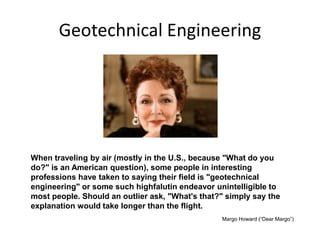Rumored Buzz on Geotheta
Rumored Buzz on Geotheta
Blog Article
The Of Geotheta
Table of ContentsFascination About GeothetaSome Known Factual Statements About Geotheta What Does Geotheta Do?Our Geotheta PDFsAbout Geotheta

They carry out site examinations, accumulate samples, execute lab tests, and analyze data to assess the suitability of the ground for building jobs - Geo Tech Engineer. Based on their findings, geotechnical engineers offer recommendations for structure design, slope security, maintaining frameworks, and reduction of geotechnical threats. They team up with other specialists, such as architects, structural engineers, and building groups, to ensure that geotechnical considerations are integrated into the overall job design and application
By evaluating the habits and residential properties of soil and rock, they can identify potential geotechnical threats such as landslides, dirt negotiation, or slope instability. Their proficiency helps protect against failings or mishaps that can threaten lives and property. Below are some in-depth tasks and duties of a geotechnical designer: Website Examination: Geotechnical designers conduct website examinations to collect information on subsurface conditions.
They analyze the information to understand the residential properties and habits of the soil and rock, including their stamina, permeability, compaction characteristics, and groundwater problems. Geotechnical Analysis and Design: Geotechnical engineers evaluate the information collected throughout site examinations to assess the security and viability of the site for building tasks. They perform geotechnical calculations and modeling to examine variables such as bearing ability, settlement, slope stability, lateral planet pressures, and groundwater flow.
The Best Guide To Geotheta
Foundation Layout: Geotechnical designers play a critical duty in making foundations that can safely sustain the intended structure. They examine the soil problems and tons needs to figure out the suitable foundation kind, such as shallow foundations (e.g., footings), deep structures (e.g (https://telegra.ph/Why-Geotheta-is-Your-Go-To-for-Geotechnical-Engineers-in-South-Africa-08-02)., piles), or specialized methods like soil renovation. They take into consideration factors such as negotiation limitations, bearing capacity, and soil-structure communication to develop ideal structure designs
They assess building and construction strategies, screen site tasks, and conduct area examinations to confirm that the style suggestions are adhered to. If unforeseen geotechnical issues arise, they examine the situation and provide suggestions for remediation or adjustments to the layout. Danger Analysis and Reduction: Geotechnical designers evaluate geotechnical dangers and threats related to the project website, such as landslides, liquefaction, or soil disintegration.

Collaboration and Interaction: Geotechnical designers work very closely with various other experts entailed in a job, such as architects, architectural engineers, and building and construction teams. Reliable interaction and cooperation are necessary to incorporate geotechnical considerations right into the total project design and construction procedure. Geotechnical designers provide technical expertise, solution queries, and guarantee that geotechnical needs are satisfied.
Not known Incorrect Statements About Geotheta
Below are some sorts of geotechnical engineers: Structure Engineer: Foundation designers focus on designing and evaluating foundations for frameworks. They evaluate the dirt conditions, tons demands, and site attributes to establish one of the most ideal structure kind and design, such as superficial structures, deep structures, or specialized techniques like pile structures.
They examine the elements affecting incline security, such as dirt buildings, groundwater conditions, and slope geometry, and develop techniques to avoid slope failures and mitigate risks. Earthquake Engineer: Earthquake designers specialize in assessing and making frameworks to endure seismic forces. They analyze the seismic risk of a site, examine soil liquefaction capacity, and develop seismic design standards to make certain the safety and security and strength of structures during earthquakes.
They perform area screening, gather samples, and analyze the gathered information to define the soil properties, geologic developments, and groundwater conditions at a site. Geotechnical Instrumentation Designer: Geotechnical instrumentation engineers concentrate on monitoring and gauging the actions of soil, rock, and structures. They install and maintain instrumentation systems that keep an eye on aspects such as dirt settlement, groundwater degrees, slope movements, and architectural variations to analyze efficiency and offer early warnings of possible issues.
Geotheta Fundamentals Explained
They conduct examinations such as triaxial examinations, combination examinations, direct shear tests, and leaks in the structure tests to gather data for geotechnical analysis and layout. Geosynthetics Designer: Geosynthetics engineers focus on the layout and application of geosynthetic products, such as geotextiles, geogrids, and geomembranes. They make use of these materials to boost soil security, reinforce inclines, offer drainage options, and control erosion.
They tend to be investigatory people, which means they're intellectual, reflective, and investigative. They are curious, methodical, logical, logical, and rational. Some of them are likewise social, implying they're kind, charitable, participating, person, caring, practical, compassionate, sensible, and friendly - Consulting Engineer.
In the workplace environment, geotechnical engineers utilize specialized software application devices to do estimations, create styles, and assess information. They prepare records, review project specs, interact with clients and staff member, and coordinate task tasks. The workplace setting supplies a favorable atmosphere for research, evaluation, and partnership with other experts associated with the job.
Facts About Geotheta Revealed
They frequently check out project websites to perform site examinations, examine geotechnical conditions, and collect data for evaluation. These check outs entail taking a trip to different areas, sometimes in remote or challenging surfaces. Geotechnical designers might execute soil tasting, conduct examinations, and screen building activities to make certain that the geotechnical elements of the task are being executed appropriately.
Geotechnical engineers additionally work in specialized geotechnical labs. In these facilities, they carry out experiments, execute tests on soil and rock examples, and analyze the engineering properties of have a peek here the products. Geotechnical laboratory designers work thoroughly in these environments, managing screening tools, running tools, and recording information. They collaborate with other lab team to guarantee precise and trustworthy screening results.
Report this page